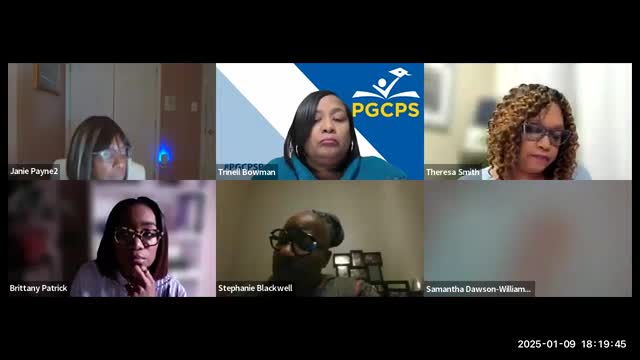PGCPS disability advisory board forms subcommittees, asks legal office to advise on bylaws
Get AI-powered insights, summaries, and transcripts
Subscribe
Summary
At its Jan. 9 meeting, the Prince George’s County Public Schools Disability Issues Advisory Board voted to create subcommittees to review Board Policy 1700 and to study school accessibility and employment/hiring practices; members also asked the Board of Education—s legal staff to confirm whether the advisory board must adopt bylaws.
The Prince George's County Public Schools (PGCPS) Disability Issues Advisory Board on Jan. 9 voted to create subcommittees to develop recommendations for the board of education, and requested legal guidance on whether the advisory board must adopt formal bylaws.
The board approved a motion to form a subcommittee charged with drafting written recommendations on potential improvements to Board Policy 1700; those recommendations must be distributed to all DIAB members in advance of the next meeting for review and discussion, the motion said. "I'd like to establish an advisory subcommittee of advisory board members who will provide written recommendations to the committee as a whole on potential improvements to board policy 1700," said Britney Patrick, a DIAB member, who moved the motion. The motion passed on a voice vote after amendment and discussion.
Why it matters: Policy 1700 is the document that defines the purpose and duties of this advisory board. Members said they need legal clarity about whether the policy requires bylaws, and whether subcommittees must meet in public under the Maryland Open Meetings Act before they begin working.
During discussion, members proposed subcommittees aligned to the three topic areas listed in Policy 1700. The advisory board established three working groups by member sign-up: (1) Policy 1700 review; (2) new-school construction and accessibility for facilities; and (3) employment and hiring practices. Members volunteered live during the meeting; volunteers include Britney Patrick, Theresa Smith and Sarah Byrne (Policy 1700); Tranelle Bowman, Theresa Smith and Chair Stephanie Blackwell (New-school construction & accessibility); and Chair Blackwell, Janie Payne, Britney Patrick, Rachel Doyle and others (Employment & hiring). The chair and vice chair will collect member sign-ups and publish the subcommittee rosters.
Legal guidance and public-meeting rules were a major focus. Tia Johnson, board office staff, said she would seek clarification from the Board of Education's legal team about whether bylaws are required and how the Maryland Open Meetings Act applies to DIAB subcommittees. Phil Fitzpatrick, board staff, cautioned against informal email discussions with more than a quorum of members: "What you don't want to do is engage in a discussion with more than a quorum of this committee on the email chain, because then that would not be an open meeting." He said he would follow up with answers by the next day where possible.
Members also discussed interim procedures while they await legal guidance. Several suggested using Robert's Rules of Order and relying on the existing language of Policy 1700 to guide work until the legal office advises otherwise.
Additional administrative steps approved or planned at the meeting included asking the chair, vice chair and staff to contact the Board of Education legal team before the next meeting and to coordinate with administration on outreach to schools and parents so the advisory board's membership and work are communicated broadly. The board asked staff to set up a shared place to store documents (an official email/drive) so all members receive the same materials and to report back on vacancies and appointments to fill DIAB seats.
Votes at a glance: The meeting recorded these formal actions related to bylaws and committee structure: the board approved the January 9 agenda (voice vote); approved a motion to strike item 1.4 (postponing approval of December 17 minutes) from the agenda (motion seconded and approved); approved a motion to establish a subcommittee to draft recommendations on Board Policy 1700 and distribute them to members before the next meeting (moved by Britney Patrick; motion amended and approved by voice vote); approved a motion directing the chair, vice chair and staff to request clarification from the Board of Education legal team about the need for bylaws and Open Meetings Act requirements for subcommittees (moved and seconded; approved by voice vote); and approved forming the working subcommittees on Policy 1700, new-school construction & accessibility, and employment/hiring (members volunteered during the meeting and the chair will publish rosters).
What the board did not do: No bylaws were adopted at this meeting; members agreed to seek legal advice before drafting or approving bylaws. A proposed motion to assign an "ADA compliance officer" to the facilities subcommittee was withdrawn after staff advised that the specific title may not exist in the district; staff said they would identify the appropriate administrator or designee who performs ADA-related functions.
Next steps: Staff (Tia Johnson and others) and the chair and vice chair will contact the Board of Education legal team for written guidance about whether DIAB must adopt bylaws and on the Open Meetings Act implications for subcommittees. Members also will receive a shared repository and the updated membership list and will be asked to begin subcommittee work after staff confirms meeting/publication requirements. The board scheduled its next full meeting for Jan. 21, 2025, at 6 p.m.
The meeting transcript shows members repeatedly emphasized urgency about beginning substantive work on the three policy topics once legal and administrative questions are answered; they also requested a centralized document repository and consistent public communications about the group's membership and role.
